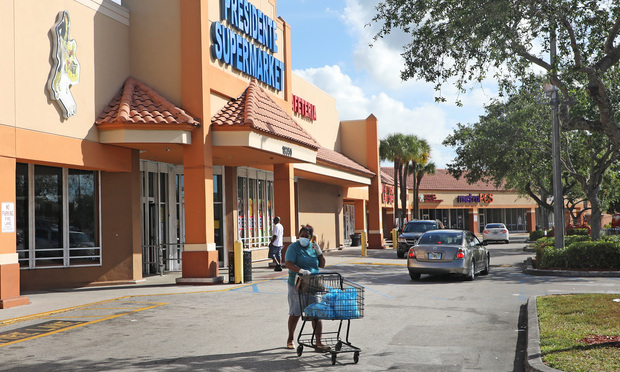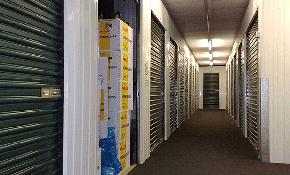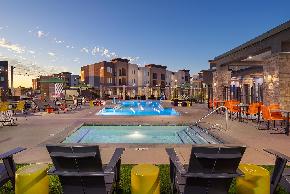 A shopper, wearing a protective mask for COViD-19, walks out of Presidente Supermarket at 18350 NW 7th Ave at Miami Gardens Shopping Center. Photo: J. Albert Diaz/AM
A shopper, wearing a protective mask for COViD-19, walks out of Presidente Supermarket at 18350 NW 7th Ave at Miami Gardens Shopping Center. Photo: J. Albert Diaz/AM
On a normal day, Centennial Bank’s Florida operations would issue five loans and get two others repaid, but nothing has been normal since the coronavirus set in and threw the once robust commercial real estate market into uncertainty.
 David Druey
David Druey
“We are not lending any new money,” said David Druey, Centennial Florida regional president in Pompano Beach. “We haven’t had people calling us saying, ‘Oh, I want to borrow money.’ It’s not really about expansion today.”
The bank, which has $4 billion in assets from the Florida Keys to Orlando, saw requests halt in the second week of March when COVID-19 shut down sports tournaments, conferences and music festivals. The closing of hotels and all retail except grocery stores, pharmacies and gas stations followed, a massive blow to South Florida’s tourism and entertainment-based economy.
“That’s when everybody went, ‘This is a serious thing. Let me hit pause,’ ” Druey said.
With so much uncertainty, banks and alternative lenders alike are wary — and could remain wary for some time — of issuing new debt. Retail and hospitality are the hardest hit with massive furloughs and layoffs, but high-flying industrial property owners and users aren’t immune.
Last-mile delivery centers dealing in e-commerce are expected to do well as more people stuck at home switch to online shopping. But warehouses catering to cruise lines, airlines and the convention industry are struggling.
 Bowman Brown
Bowman Brown
“In general, banks will be very careful with extending new credit to existing clients, including industrial and retail,” said Bowman Brown, a Shutts & Bowen partner in Miami. “It’s clear that the economy in Florida is going to be impacted negatively because Florida is so focused on tourism and entertainment. They are going to be very concerned about the health of their borrowers, so I don’t think they are going to want to lend aggressively to anybody.”
The serious economic slowdown is expected to have a trickle-up effect as tenants skip rent payments. Restaurant Cheesecake Factory, Subway and Mattress Firm announced they would stop or skimp on rents payments.
This leaves landlords stuck between nonpaying tenants and their own lenders. A deluge of loan defaults is expected once courts lift foreclosure moratoriums.
 Jason Vanslette
Jason Vanslette
“We are expecting an uptick in the default space because of those companies, corporations and residents that are affected by the long-term effects of the hit on the economy,” said Jason Vanslette, partner at Kelley Kronenberg in Davie.
One scenario projects an 8 percent default rate on commercial real estate loans, up from the current 0.4%, with the lodging industry taking the hardest hit, according to research by analytics firm Trepp LLC, part of British media company Daily Mail and General Trust.
Hotel loans could experience a 35% default rate followed by retailers at 16% through the end of 2023, according to Trepp. Office loans could have a 4.3% default rate, while multifamily and industrial would fare relatively well at 3% each.
South Florida has the nation’s highest outstanding balance of commercial mortgage-backed securities, or CMBS loans, for large metropolitan areas at $4.23 billion on 77 hotel loans, according to another Trepp report. Las Vegas, New York and Los Angeles follow in the $3 billion to $4 billion range.
 Jay Sakalo
Jay Sakalo
Originators of CMBS loans pool bond packages, according to Jay Sakalo, a Bilzin Sumberg partner in Miami. The stability and performance of each pool depends on the types of loans in each package.
A pool largely made up of hotel and retail loans won’t fare as well as a pool with fewer hotel and retail loans.
“How any one pool will fare will depend on the quality of the loans in that particular pool,” Sakalo said.
Forbearance
Lenders and landlords alike are working to stave off defaults through forbearance, or selectively enforcing debt payments.
Pebb Capital, a Boca Raton-based real estate investor, is working with its bank lenders for its Hampton Inn in Miami Beach and its bar and restaurant plaza in Riviera Beach.
“My goal is not to get more than I am entitled to,” co-founder and managing principal Todd Rosenberg said, fully expecting a decline in revenue. “The idea here is, ‘Help me get through this time so that we are able to get the hotel back open and up and running and cash flowing and we will make our payments. And we will pay back whatever payments we have to pay.’ ”
As of late March, Pebb was awaiting a proposal from its hotel lender with the bank indicating it would work out a deal, Rosenberg said.
“ Whether it’s a deferral or forbearance, we will see for how long and how repayment of the deferred interest payments will be spread out and are there extension options,” he added. ”So long as they play ball, that allows us to play ball with our tenants.”
Just as lenders are working out agreements with landlords, landlords are helping tenants.
Tricera Capital, a Miami-based investment company focusing on urban retail, deferred April rent for tenants at Flagler Uptown at 750 N. Flagler Drive and The Hive at 900 N. Flagler Drive in Fort Lauderdale’s trendy Flagler Village. Businesses include a yoga studio and coffee shop, both nonessential and closed. Their April rent was pushed back to the end of their leases.
 Scott Sherman
Scott Sherman
“The reality is right now we are capitalized well enough that we have reserves on our properties to deal with these types of things,” said Scott Sherman, Tricera co-founder and managing principal. “We don’t have unlimited amounts of reserves. Can we get through April? Yeah. Can we get through next year? It’s not going to be simple. At some point, I don’t know what we are going to do.”
Most of Pinecrest-based MMG Equity Partners’s 40 shopping plazas are anchored by a grocery store or a Navarro Discount Pharmacy, which have remained open.
 Gabriel Navarro., managing partner MMG Equity Partners (Photo: Courtesy Photo)
Gabriel Navarro., managing partner MMG Equity Partners (Photo: Courtesy Photo)
But its mom-and-pop tenants such as beauty salons and dry cleaners, will have a hard time. The drop in April rent collections has yet to be estimated, said MMG managing partner Gabriel Navarro.
“We are talking to the tenants and at the same time we are talking to our lenders. We recognize that our smaller tenants are obviously going through a difficult time. We will work with them however we can while still meeting out obligations,” Navarro said. “We have begun to speak to lenders to see what assistance they might be able to provide in order to allow us to offer more assistance to the retailers.”
Bailout a ‘Miss’
Federal and state governments have unleashed relief packages, but South Florida landlords say the programs either won’t help them or are difficult to access.
Under the $2 trillion economic package, the U.S. Small Business Administration is offering low- to no-interest loans for businesses hurt by the coronavirus. Florida was allocated $50 million for $50,000, one-year, interest-free loans.
Doral-based freight forwarder Amcar-Lamprecht Transport Inc. applied for an SBA loan March 17 but by month’s end was struggling to find out the status of its request.
“The government keeps preaching that it will offer small businesses loans and grants so they may survive during this epidemic but no clear message on how to access these funds,” said Amcar-Lamprecht vice president Ricardo Valdes.
After a three-hour wait on the phone with SBA, a representative told Valdes that there’s a backlog and it’s unclear when his application would be processed.
“This needs to be streamlined in order to release the necessary loans and grants to businesses now and not two to six months down the road,” he said.
Amcar, which owns its 106,769-square-foot warehouse at 10100 NW 25th St., didn’t ask its mortgage lender, Citibank, to waive its April payment on the 20-year mortgage. Amcar has enough reserves for a year, but a freezer purchase has been shelved, Valdes said.
As for Pebb Capital, the $2 trillion law doesn’t address commercial real estate owners, Rosenberg said, noting the small business provision is for payroll and not rent. If funds are used for rent or utilities, the loan won’t be forgiven.
“They missed the point, which was you are supposed to provide the short-term capital to the underlying small businesses so that they can pay their employees and their rent,” Rosenberg said.
The hospitality bailout focuses on hotel giants like Marriott International and Hilton Hotels & Resorts, which furloughed thousands of staff.
The brand name companies don’t own most of the hotels carrying their names. Owners like Pebb develop the hotels and use the brand’s booking systems.
“The actual damage and actual liability falls on me,” Rosenberg said. Hilton doesn’t “really suffer as much damage from my hotel having no customers as I do. They don’t owe my lender interest payments. Those suffering are commercial real estate owners of hotels, which is not for the most part Hilton, Marriott. It’s private real estate owners.”
Unlike Great Recession
Experts already expect the coronavirus economic cliff to be more severe than the 2008-2010 Great Recession and 9/11.
“The economy is going to be heavily impacted. I think there will be unfortunately a high unemployment rate. That will impact consumer spending and that will flow through to retail,” Brown said.
The U.S. already is reporting a record number of unemployment benefit applications. And the medical crisis is having a more widespread economic impact than the financial crisis of 2008.
“It’s having a ripple effect across industries,” MMG’s Navarro said. “The impact — be it to retail landlords, to multifamily landlords who are going to be challenged with individuals paying rents, office landlords who are going to be challenged by office tenants having difficulty to pay rent — I think the impacts are going to be across every asset class and every asset. I don’t think anybody is immune from this one.”
[falcon-embed src="embed_1"]
[falcon-embed src="embed_2"]

















 Copyright © 2024 ALM Global, LLC. All Rights Reserved.
Copyright © 2024 ALM Global, LLC. All Rights Reserved.